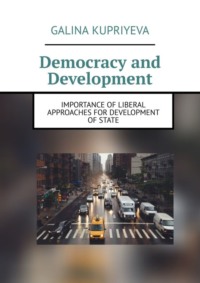Kitabı oku: «Democracy and Development. Importance of liberal approaches for development of State»
© Galina Kupriyeva, 2020
ISBN 978-5-0051-2731-0
Created with Ridero smart publishing system
PLAN:
– INTRODUCTION.
– Theoretical framework.
– Defining the meaning of concepts.
– Transitions to Democracy
– Conclusion.
INTRODUCTION
Political Liberalism (Democracy) and Economic Liberalism (Free Market) take their roots in the mid 19th century. They followed, along with Mercantilism, the collapse of feudalism system and started in Europe, notably, in Great Britain, with the first wave of Democratization in 1828, according to S.Huntington, (yet Robert Dahl define beginning of democracy as 1776 when the American Revolution took place). Politically, Democracy started after 1870 because of profound restrictions of suffrage and, at first, Democracy was resisted by elites and was limited by the poor development of state. Afterwards, Democratization had rapid spread into the Western Europe, US, Canada, Australia and New Zealand. However, some may claim that for small countries of Asia, Latin America and Africa the democratic model is not acceptable because of distinct features belonging to these states such as culture, religion etc. But, we can see, that in countries where authoritarianism was established, notably Portugal, Greece, Spain, as well as some countries of Latin America, the system of centralized planning had not survived. Those lasted for twenty, thirty or forty years but then were swept by new wave of democratization and gone. “People get tired, fed up and want something new; that is what happened to many of these authoritarians”1. Nowadays, with the failure of ISI model in Latin America and Turkey, as well as with disintegration of the Soviet Union and Eastern Europe, the world experiences new wave of democratization and return to Liberal approach in politics and economics. The aim of this essay is to discover how liberal approach in politics and economy is better for development than other non-democratic regimes. The first part of this essay is theoretical framework that includes view of different scholars who advocate neoclassical approach. Second part addresses to main definitions and concepts used in the essay. Third part shows the process of transitions to democracy in different parts of the world, and also, different outcomes of democratization process (or different types of democracy)
THEORETICAL FRAMEWORK
Olle Tornquist, in “Politics and Development” argues that in reality, politics and development come together. He considers that after the Cold War, many disputes and interests of anti-colonial and anti-imperialists struggles that delay progress of development in Third World countries became a history. In addition, developing countries differ from one another. Therefore, for these countries, specific political approach should be adopted, that addresses to interaction of both economic and political aspects. The author argues that the models of growth that were applied in Third World countries during the Cold War, were oriented on changes by political means. Such models include development projects based on “Nation-State” and “Statism” (or Import Substitution Industrialization), with the interference of government into economy and market, that lead to failure of development in this countries.
The main critique of public intervention stems from Neoclassical theories. Firstly, P.T.Bauer (1972 and 1987), generalizing from his experience in India, considered “…government failure, i.e.corruption and mismanagement, more critical than market failure, …intervention caused and did not cure market imperfections.”2 Secondly, Scitovsky and Scott (1970) showed inefficiency of public intervention – “…the incentives they created were highly unequal for different economic actors.”3 Thirdly, the success of export-oriented countries support the claims of Harry Johnson’s (1967) and Ann Kruger (1984) about free trade as the point of departure for dynamic reasons.
More recent neoclassical political economists, basing on models of state intervention, sought to show inefficiencies in such state-market relations. In that way, Mancur Olson (1982) showed how interactions are inefficient in small groups where each individual pursue his own self-interest, and because of the presence of free-riders, people are unlikely to organize themselves in collective (or national interest). Another scholar – Buchanan (1980) and “public choice” school focuse on profit-seeking by government and the emergence of monopoly. In general, recent neoclassical theories accepted fusion of economic and political spheres, with a minimal role of government.
In course of time, with the economic development, older traditional social and economic forms live out itself and new social forces emerge that seek changes and orient toward globalization. In support to the neoclassical theorists, Howard J. Wiarda considers the evidence of transition to democracy in developing world. Among the reasons of this transition, there are 4 factors: failure of Authoritarianism, the end of the Cold War, Globalization and Elite leadership.
Ücretsiz ön izlemeyi tamamladınız.
